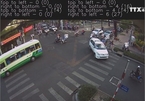Flax Scanner, the world processing software utilizing AI technology developed by Cinnamon, allows enterprises to collect information automatically from many types of documents, such as invoices, identity cards, contracts and business reports, and turn it into easy-to-process information.

Flax Scanner is popular in Japan and Europe. But in Vietnam, which is a software outsourcing and production center, it still cannot find clients.
Nghiem Xuan Bach, managing director of Cinnamon Vietnam, said he had met many banks and financial institution officials in Vietnam but had failed to persuade them to use Flax Scanner.
“They (the financial institutions) said with the amount of money to pay for using Flax Scanner, they would rather hire 10 workers to enter data into system,” Bach said.
| New technologies, including AI and Big Data, will be the new economic growth momentum for Vietnam. However, there is still much work to be done to bring the new technologies to life. |
Explaining the limited application of AI and Big Data in Vietnam, Bach said the expenses on human resources still account for a large proportion in enterprises’ costs.
“The pay in the AI sector is like ‘bubble’. Foreign and domestic firms pay sky-high wages to AI engineers,” he said. “A worker with just 2-year experience can receive up to $2,000."
AI products still are not popular among the business circle as the labor cost in Vietnam is still lower than the cost of application of new technology. In order to expand the market, businesses in the field have to disseminate knowledge about the importance of AI, while accepting losses as the market scale is not attractive enough.
Bach went on to say that more than 90 percent of Vietnam’s enterprises have small and medium operation scale. They still have not digitized their businesses, so they cannot implement smartization through AI.
“It takes 3-5 years for business digitization, and then smart upgrades through AI. The sale cost is high,” he said.
Pham Hong Phong, director of Oracle Vietnam, said developing the labor force to research and develop products and services based on the smart technology proves to be a great challenge for Vietnam.
There is another problem, according to Phong, that AI essentially is based on machine learning, and therefore, it needs data. The bigger the data is, the better the algorithm works. AI requires big high-quality and clean data, while data in Vietnam still cannot satisfy the requirement.
Data security is a big barrier. The awareness of data security and privacy of Vietnamese people remains weak. Enterprises, when collecting materials, need to be sure that the information won’t be distributed to third parties and that staff won’t copy the materials for sale.
Kim Chi

Vietnam puts priority on artificial intelligence development
In the development of the fourth industrial revolution, artificial intelligence (AI) has made significant progress and is expected to make breakthroughs in the next ten years.

Artificial Intelligence serves social development
The fourth industrial revolution, with Artificial Intelligence (or AI) as its core element, has shaken up the world in recent years. Vietnam is no exception. In Vietnam, AI has been gradually integrated into all spheres.
 New technologies, including AI and Big Data, will be the new economic growth momentum for Vietnam. However, there is still much work to be done to bring the new technologies to life.
New technologies, including AI and Big Data, will be the new economic growth momentum for Vietnam. However, there is still much work to be done to bring the new technologies to life.